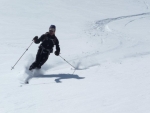Central apnea...moving to sea level
Re: Central apnea...moving to sea level
My doctor prescribes Diamox routinely as an adjunct to ASV for CSA. 125mg before bed every night. Certainly would be cheap to try before making the big move.
-
Apneanderthal
- Posts: 50
- Joined: Thu Sep 19, 2013 1:04 pm
- Location: Orlando, Florida
Re: Central apnea...moving to sea level
Thanks for the tip. I've heard about this. You've been taking long term? I thought this was more of a short term thing.
_________________
| Mask: AirFit™ P10 Nasal Pillow CPAP Mask with Headgear |
| Additional Comments: PR System One Auto SV Advanced Model 960P |
Re: Central apnea...moving to sea level
Yes, typically it is used short term at higher doses for altitude sickness.Apneanderthal wrote: ↑Wed Aug 29, 2018 9:53 pmThanks for the tip. I've heard about this. You've been taking long term? I thought this was more of a short term thing.
I've only been with this doc for about 3 months so I don't have years of experience with it, but he says that he does have patients who have been on it for years.
Re: Central apnea...moving to sea level
So I have CSA. I live at 6,2xx’. Lived here 32 years.
I also use 5lpm nighttime supplemental o2. I started paping in 2014. Added o2 in 2016.
Years Prior to diagnosis, I had noticed how tired and groggy I feel at sea level. My best guess was super saturated o2.
I have never missed a night on my machine. My AHI is usually under 2. I use my o2 at altitude (Home, traveling, camping) when 2,000’ or higher. I don’t make any adjustments to my ASV machine, but lower the o2 when below 5,500’. I have camped up to 8,100’ with no problems. I run a generator all night to power my equipment.
I have never been told there may be a correlation between altitude and CSA. Medical professionals mislabele me constantly as having OSA. if having altitude related CSA was common, I think folks here would be aware of it. I will quiz my dr when I see him in a couple weeks. And search pubmed.
I also use 5lpm nighttime supplemental o2. I started paping in 2014. Added o2 in 2016.
Years Prior to diagnosis, I had noticed how tired and groggy I feel at sea level. My best guess was super saturated o2.
I have never missed a night on my machine. My AHI is usually under 2. I use my o2 at altitude (Home, traveling, camping) when 2,000’ or higher. I don’t make any adjustments to my ASV machine, but lower the o2 when below 5,500’. I have camped up to 8,100’ with no problems. I run a generator all night to power my equipment.
I have never been told there may be a correlation between altitude and CSA. Medical professionals mislabele me constantly as having OSA. if having altitude related CSA was common, I think folks here would be aware of it. I will quiz my dr when I see him in a couple weeks. And search pubmed.
_________________
| Mask: Simplus Full Face CPAP Mask with Headgear |
| Humidifier: S9™ Series H5i™ Heated Humidifier with Climate Control |
| Additional Comments: Machine: Resmed S9 VPAP Adapt. 25 max pressure/15 max EPAP/ 6 min EPAP/ 15 max PS /0 min PS. Inogen At Home, 4 lpm |
- Jas_williams
- Posts: 1120
- Joined: Tue Dec 19, 2017 2:12 pm
- Location: Somerset UK
Re: Central apnea...moving to sea level
I have CSA at sea level so I can't help I suppose but it would be good to see your graphs so we an see what we are dealing with and what events are left after treatment. Most health providers have no idea how to setup or tune the ASV devices and just go with the defaults.
_________________
| Mask: Bleep DreamPort CPAP Mask Solution |
| Additional Comments: Using sleepyhead and a pressure of 6 - 21 Resmed S9 Adapt SV with a Bleep Sleep Mask |
Re: Central apnea...moving to sea level
It could be that you have mild altitude sickness and in your case it affect's CA's.
Does it also affect OA or H ?
I would be happy to see graphs of your ASV at see level and at home.
My sleep apnea is not affected by altitude.
Does it also affect OA or H ?
I would be happy to see graphs of your ASV at see level and at home.
My sleep apnea is not affected by altitude.
_________________
| Machine: AirCurve™ 10 VAuto BiLevel Machine with HumidAir™ Heated Humidifier |
| Mask: Forma Full Face CPAP Mask with Headgear |
| Additional Comments: AirCurve 10 CS PaceWave, Full Mask, sleepyhead, ASV Min EPAP 5 Max IPAP 10.4 PS 0.4-5.4 |
Only ME... -  - Some days sooo slow, some days just running off track ...
- Some days sooo slow, some days just running off track ...
Re: Central apnea...moving to sea level
There have been some studies re Diamox for Sleep Apnea. Topical progesterone (guys typically make 3-4 mgm/day, women 21-23 mgm) also mildly helps prevent hypoxia.Apneanderthal wrote: ↑Wed Aug 29, 2018 9:53 pmThanks for the tip. I've heard about this. You've been taking long term? I thought this was more of a short term thing.
Some years ago, a member here posted that they were dealing with mild hypoxia living at altitude. As I recall she tried everything and only moving to a lower altitude resolved the problem.
If your thyroid is low functioning, then your body's response to the chemical signal to breathe is likewise blunted. If your haven't had a full thyroid panel (free T3, free T4, TSH, reverse T3, thyroid antibodies) run, good idea to get it and rule out thyroid issues.
If it were me, before I'd move, I'd buy a recording oximeter and run it for a few nights to see how bad the desats are at altitude and also at sea level. Too, I might even wear it during the day without CPAP to see if your body is just not able to get sufficient oxygen at altitude. I'd also check last blood work for RDW and total red blood cell count...both should be above normal. Mine were until I got my therapy optimized.
Last edited by Muse-Inc on Fri Aug 31, 2018 1:10 am, edited 1 time in total.
ResMed S9 range 9.8-17, RespCare Hybrid FFM
Never, never, never, never say never.
Never, never, never, never say never.
Re: Central apnea...moving to sea level
My family lives at about 7000 feet. My son's first sleep study was done at near sea level; his O2 sats were fine, he had 0 centrals, and his AHI fell into the mild category. My son's local neurologist was concerned that the sleep apnea might be worse at elevation so a 2nd sleep study was ordered. At 6500 feet my son's AHI was substantially higher, half of his events were centrals, and his O2 was under 88 for an hour. His treated numbers are better than yours, but like you when we travel to lower elevations his AHI drops and when we go to the mountains we see substantial increase in AHI. My mother also has sleep apnea, her AHI does not seem to vary with changes in elevation. We are all different, but high elevations can certainly cause centrals in some people. If you are confident that your treatment is optimized, moving to a lower elevation may be your best option. It would be a good idea to do a sleep study at sea level before giving up your ASV to make certain that your untreated numbers are acceptable.
Re: Central apnea...moving to sea level
I find this really interesting because subjectively I have found progesterone to be beneficial, but I really haven't been able to find any references that discuss its use for this purpose in males, and in general people freak out about hormones so I've always been afraid to use it long term.
Any idea if anyone, especially a male, has used it long term?
Re: Central apnea...moving to sea level
Google "topical progesterone AND male" lotta sites. Then, google "topical progesterone and sleep apnea" and get different sites. Lotta info here: https://www.progesteronetherapy.com/pro ... r-men.html. Go dowd to the bottom of this article for a warning about transfer of bioidentical hormones: http://www.virginiahopkinstestkits.com/ ... nsfer.html.brookfox wrote: ↑Thu Aug 30, 2018 6:54 amI find this really interesting because subjectively I have found progesterone to be beneficial, but I really haven't been able to find any references that discuss its use for this purpose in males, and in general people freak out about hormones so I've always been afraid to use it long term.
Any idea if anyone, especially a male, has used it long term?
ResMed S9 range 9.8-17, RespCare Hybrid FFM
Never, never, never, never say never.
Never, never, never, never say never.
- zoocrewphoto
- Posts: 3732
- Joined: Mon Apr 30, 2012 10:34 pm
- Location: Seatac, WA
Re: Central apnea...moving to sea level
Apneanderthal wrote: ↑Wed Aug 29, 2018 2:50 pmAs for how I know my apnea improves at sea level, over the years I took my ASV with me on many trips (I travel to sea level about 4-5 times a year). I monitor my numbers pretty closely, and as I'd predicted (and as my sleep doc had told me), my numbers improved dramatically at sea level. To the point that there's no discernable apnea at all. My average AHI is 8-12 here at home, as read on my ASV. At sea level it drops to 0.2 or so. After a couple years I just quit bringing it with me any time I travel to sea level.
You do realize that those are your TREATED numbers. The data can only show you what the machine didn't fix, not all the stuff it prevented.
My ahi is normally below 1 with cpap. Down from 79+. I am not cured. I am simply well treated.
If your ahi is running 8-12 at home, then you are not well treated. It sounds like your *treatment* works better when you travel. But that doesn't mean you are cured and will have success without your ASV.
_________________
| Mask: Quattro™ FX Full Face CPAP Mask with Headgear |
| Humidifier: S9™ Series H5i™ Heated Humidifier with Climate Control |
| Additional Comments: Resmed S9 autoset pressure range 11-17 |
Who would have thought it would be this challenging to sleep and breathe at the same time?
Re: Central apnea...moving to sea level
Thanks. Something new for me to research.Muse-Inc wrote: ↑Fri Aug 31, 2018 1:07 amGoogle "topical progesterone AND male" lotta sites. Then, google "topical progesterone and sleep apnea" and get different sites. Lotta info here: https://www.progesteronetherapy.com/pro ... r-men.html. Go dowd to the bottom of this article for a warning about transfer of bioidentical hormones: http://www.virginiahopkinstestkits.com/ ... nsfer.html.brookfox wrote: ↑Thu Aug 30, 2018 6:54 amI find this really interesting because subjectively I have found progesterone to be beneficial, but I really haven't been able to find any references that discuss its use for this purpose in males, and in general people freak out about hormones so I've always been afraid to use it long term.
Any idea if anyone, especially a male, has used it long term?
-
nicholasjh1
- Posts: 517
- Joined: Wed Jun 14, 2017 9:07 am
Re: Central apnea...moving to sea level
Also I would question how you know your apnea is gone at sea level. I know for me if I'm untreated I have 0 memory of apneas... due to the blackouts I think.... If your oxygen went below a certain number during the apnea test I'd definitely question the ability to "know" if the apnea was happening or not when untreated. I know that number was 70% o2 saturation for me, but I have no idea how low it has to get for personal "blackout" conditions. That being said. I think changing my pressure from 7 to 14.7 starting changed my sleeping outcomes by quite a bit... with a higher pressure there should be no difference between 5000 ft and sealevel (at least with taping and a nasal interface that I use... low leakage and a higher pressure = there is no difference at sealevel.. and as others have alluded to 12 apneas a night is not effective treatment.nicholasjh1 wrote: ↑Wed Aug 29, 2018 2:13 pmWell it may be worth noting that I only have OSA, and when I have gone to sea levelin the pastI feel a ton better (while still using my machine). That being said, I've optimised my treatment, and now I feel good all the time, so you might want to think about how confirmation bias could be related to your sealevel experience and as others have noted... before you uproot your entire life to "cure" your apnea at sealevel it might be worth taking a sleeping test at sealevel.
_________________
| Machine: ResMed AirSense™ 10 AutoSet™ CPAP Machine with HumidAir™ Heated Humidifier |
| Mask: AirFit™ N30i Nasal CPAP Mask with Headgear Starter Pack |
Instead of Sleep apnea it should be called "Sleep deprivation, starving of oxygen, being poisoned by high CO2 levels, damaging the body and brain while it's supposed to be healing so that you constantly get worse and can never get healthy Apnea"
Re: Central apnea...moving to sea level
I live about 20 miles from the OP (Loveland), and have for the last 10 years. Before that I was at near sea-level in Michigan, where I was originally diagnosed. The sleep study in MI showed a ton of obstructive events, and the sleep study in Boulder showed nothing but centrals. Of course, I don't know how it compares since one was done before I had come near a CPAP device and the other - after I had been on CPAP for 5 years and I couldn't truly fall asleep without my machine. I suspect I have UARS (tons of RERA events), so it may be rather complicated. I do tend to feel better when I go to sea level for a few weeks, but only on the machine - I haven't slept one night without the machine once I got "hooked" on it.
The mental aspect of sleep is very significant and while even the deepest belief that you'll get cured of sleep problems might not be able to help, it is very easy for even the slightest suspicion that something is not right to ruin your sleep. I'd be happy to share my experiences and some knowledge, but I'd never try to convince anyone of anything.
McSleepy
The mental aspect of sleep is very significant and while even the deepest belief that you'll get cured of sleep problems might not be able to help, it is very easy for even the slightest suspicion that something is not right to ruin your sleep. I'd be happy to share my experiences and some knowledge, but I'd never try to convince anyone of anything.
McSleepy
_________________
| Machine: AirCurve™ 10 VAuto BiLevel Machine with HumidAir™ Heated Humidifier |
| Additional Comments: Previous machine: ResMed S9 VPAP Auto 25 BiLevel. Mask: Breeze with dilator pillows. Software: ResScan ver. 5.1 |
ResMed AirCurve 10 VAuto; Puritan-Bennett Breeze nasal pillow mask; healthy, active, middle-aged man; tall, athletic build; stomach sleeper; on CPAP since 2003; lives @ 5000 ft; surgically-corrected deviated septum and turbinates; regular nasal washes
Re: Central apnea...moving to sea level
Just fyi, The lowest point in Michigan is 571 feet above sea level.
Get OSCAR
Accounts to put on the foe list: dataq1, clownbell, gearchange, lynninnj, mper!?, DreamDiver, Geer1, almostadoctor, sleepgeek, ajack, stom, mogy, D.H., They often post misleading, timewasting stuff.
Accounts to put on the foe list: dataq1, clownbell, gearchange, lynninnj, mper!?, DreamDiver, Geer1, almostadoctor, sleepgeek, ajack, stom, mogy, D.H., They often post misleading, timewasting stuff.













